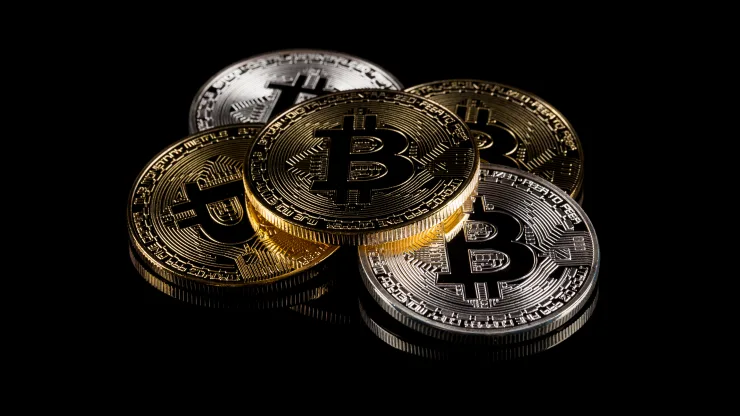
Bitcoin isn’t running alongside meme stocks as it did three years ago, although this week’s stock market action might indicate a big crypto rally is on its way.
GameStop and fellow meme stock AMC Entertainment are each up more than 160% over the past two days. Meanwhile, bitcoin is little changed, down just 0.1% in the same period, according Coin Metrics. In 2021, by contrast, GameStop and AMC rallied 821% and 373%, respectively, from January through April. Bitcoin’s gains in that time, though more modest, still came to 96%.
“This isn’t 2021 when the world was locked down and awash with liquidity,” said Antoni Trenchev, cofounder of crypto exchange Nexo. “It’s worth remembering GameStop mania peaked in January 2021, well before bitcoin’s more than $60,000 highs in April and November that year. If you want to read into events of the past 24 hours you could suggest GameStop may be acting as a leading indicator ahead of the next leg of bitcoin’s post-halving run.”
“Today’s stronger than estimated U.S. producer price data is a reminder that the macro[economic] and inflationary backdrop isn’t conducive for a bitcoin rally, and it’s likely to stay rangebound after an explosive opening to 2024,” he added.
To be sure, there’s a world of cryptocurrencies beyond bitcoin that includes meme coins. Still, they haven’t joined the party in the same way. Dogecoin and Shiba Inu coins have risen about 3% each in the past two days, according to Coin Metrics.
Bitcoin is widely considered in a class of its own within the crypto world, driven by macro factors when there aren’t specific catalysts to consider, such as the launch of U.S. bitcoin exchange-traded funds or the Bitcoin halving that takes place every four years.
Noelle Acheson, economist and author of the “Crypto is Macro Now” newsletter, added that the meme stock run was “more of a revving of engines than a full take-off” and that macro issues are still pressuring bitcoin.
“Tomorrow’s inflation data may boost spirits if it comes in better than expected, but uncertainty is high,” she said.
This year, the U.S. permitted the introduction of the first bitcoin ETFs, pushed largely by BlackRock, the largest asset manager in the world. The funds are expected to attract new types of investors, steady flows of new cash, all while reducing volatility. Plus, the 2023 regional banking crisis in the U.S. that kicked off the current bitcoin cycle alterted many people to cryptocurrency’s potential as an alternative financial system and hedge against uncertainty.
“Bitcoin is no longer seen as a pure speculation asset,” Acheson said. “Its store of value narrative is more deeply entrenched, its holder base is much broader and it has become to some extent institutionalized.”
Sylvia Jablonski, CEO and chief investment officer at Defiance ETFs, added that although bitcoin was “lumped into the meme stock category” in 2021, the market is starting to show signs of being taken more seriously now.
“There has been a shift towards credibility in longevity of holding bitcoin,” she said. “Bitcoin became more commercial in its ETF wrapper, and both retail and institutional investors tend to hold both bitcoin and ether, versus day trade it like meme stocks.”
With bitcoin rallying so far in the first quarter of the year, briefly approaching $73,000, it’s more recently been pulling back in what many investors describe as a healthy move. With few catalysts and challenged by macroeconomic headwinds, these investors also warn that the lull in bitcoin’s price could last several more months, and maybe pull prices lower still.
“These periods of consolidation can last a long time and are intensely dull,” Trenchev said. “The bitcoin narrative tap has run dry … and I wouldn’t expect the revival of the meme-stock frenzy to be a catalyst for bitcoin’s next move.”
























